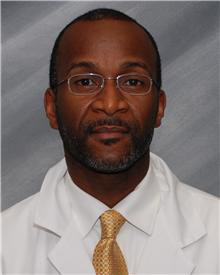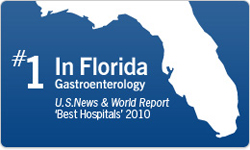

Diagnosing Digestive Disorders:
|
|
||||||
|
For the millions of Americans who suffer from digestive diseases, new technologies are improving doctors' ability to see the smallest details of the digestive tract. According to Roger Charles, M.D., chairman of the Department of Gastroenterology at Cleveland Clinic in Florida, this offers the promise of a faster and more accurate diagnosis, which can in turn lead to treatment options that are both less invasive and more targeted. Common diseases that affect gastrointestinal health include gallbladder disease, diverticulitis, esophageal reflux disease, Crohn's disease, ulcerative colitis, pancreatitis, and cancers of the stomach, pancreas, colon and rectum. Because symptoms are often similar across many conditions, getting an accurate diagnosis is essential. Dr. Charles explains how technology is helping us get it right. Cleveland Clinic Florida was among the first medical centers in Broward and Palm Beach counties to utilize a procedure called Double Balloon Enteroscopy, allowing the entire digestive tract to be visualized in real time, with the option to treat or biopsy any abnormalities right on the spot. Capsule Endoscopy, which has the patient swallowing a pill-sized camera, also allows the GI specialist to view the entire small bowel. Endoscopic ultrasound is now used to examine the lining and walls of the upper and lower gastrointestinal tract and nearby organs such as the pancreas, liver, and gallbladder. In addition, there are several advanced technologies that are innovating GI diagnosis, though they are not yet widely available. One technology, called the Spyglass™ Direct Visualization System, allows the physician to view all quadrants of a patient's bile duct, improving gall bladder disease diagnosis. Meanwhile, the Bravo pH Receiver is a new minimally invasive tool for diagnosing gastro-esophageal reflux by monitoring the patient's pH level in the esophagus. Cleveland Clinic Florida has been ranked #1 in Gastroenterology in Florida and #17 in Gastroenterology in the nation by U.S.News & World Report's 2010-11 Best Hospitals. Consultation with a physician who is a specialist in gastrointestinal diseases is the best way for a patient to obtain the right diagnosis and the best treatment. To make an appointment with Dr. Charles and the Department of Gastroenterology at Cleveland Clinic Florida, please call 1-800-639-DOCTOR, or visit www.clevelandclinicflorida.org. Return to Current Issue | |||||||
Cleveland Clinic | Home | Agenda | Faculty

 Roger Charles, MD, Chairman of the Department of Gastroenterology at Cleveland Clinic Florida.
Roger Charles, MD, Chairman of the Department of Gastroenterology at Cleveland Clinic Florida.

